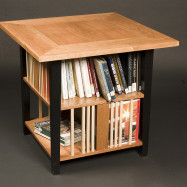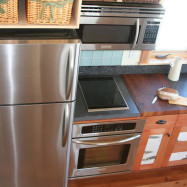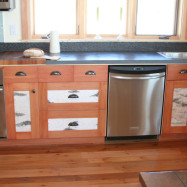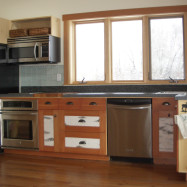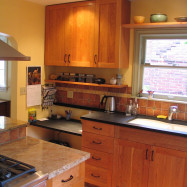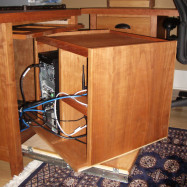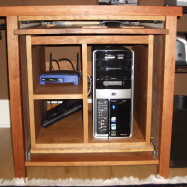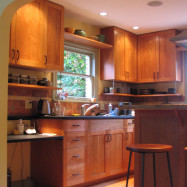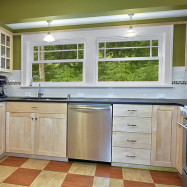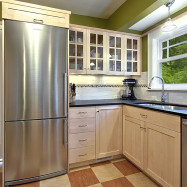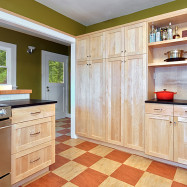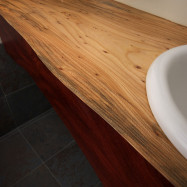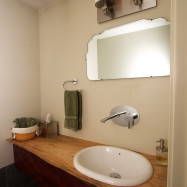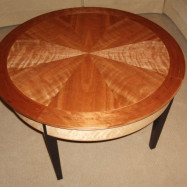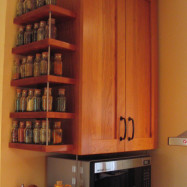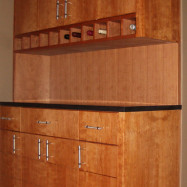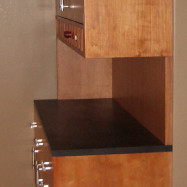- Home
- /
- Showroom
- /
- Profiles in Quality
- /
- Ravenworks LLC
Ravenworks LLC
Helping clients navigate the ever changing sea of “green.”
Back to ProfilesRavenworks LLC
A Special Green Story Built Just For You
Bob Margulis is a maverick; a high tech entrepreneur turned green cabinet maker, add social activist businessman to the mix and you have one incredible resource. “We opened our doors as a green company and have only ever made green products–we did not change to become green,” explains Margulis. This man not only knows all the issues, he takes action on them as well.
“My focus in working with clients is to help them achieve their goals of a greener lifestyle in the form of a beautiful and highly functional kitchen. People contact us because they have a real interest in moving to a greener place but that place is constantly changing,” says Margulis. “Three years ago bamboo was considered totally green but then we learned that bamboo plywood from China is filled with urea formaldehyde and the embedded energy is very high because it is shipped from across the world. Happily, we now have options that were unavailable then. With PureBond® Classic Core I can use a bamboo veneer ply that is locally produced, dead flat, and without the formaldehyde.”
Margulis saw challenges to the healthcare system in the Pacific Northwest and decided to take action: he ran for and was voted onto the Board of Group Health Cooperative and serves on the Seattle Great Cities Initiative Advisory Committee. He is also a certified Residential Green Advantage Practitioner. From the importance of indoor air quality on health to sustainable development he is clearly aware of the issues we face. He explains, “The indoors is our ecosystem. The average person thinks of green in these terms: As a human being how can I alter my behavior to minimize my impact on the larger ecosystem? But the truth is that the indoors, where we spend 90% of our lives, is our primary ecosystem. We were once told that we would have “better living through chemistry” but that chemistry is negatively impacting our indoor environment and our health. Eighty percent of a kitchen cabinet is not the nice solid wood that represents the faces of the doors and drawers, it is the box behind the door and for the last 50 years they have been a man-made product filled with a carcinogen – urea formaldehyde. Urea formaldehyde leads to cancer, learning disabilities in kids, and impacts our immune systems.”
Margulis has also been trained by the American Lung Association of Washington as a Master Home Environmentalist. This means he is qualified to evaluate someone’s home to help them discover the indoor air issues in their homes and solve related problems. He continues, “Yes we use low VOC, FSC® certified, reclaimed and salvaged materials as much as we can but the bigger issue is having a healthy home.”
Ravenworks actively seeks out interesting green material stories. One of the extraordinary materials they use is birch bark veneer. Margulis tells the story, “I found a company that teaches people to make birch bark canoes and as a byproduct of what they do they have birch bark cutoffs that are smaller than they can use. I saw the material and thought it would be interesting to use on door faces. We also use some great locally salvaged tree slabs. And right now I am searching for a salvaged vintage door to use in its existing condition as a pantry door on a current project. On another job we used a single slab of Squak Mountain Stone which is a locally produced eco-friendly concrete product made with reclaimed fly ash and paper added to the cement. We did not want to cut down a second sheet to fill the space in the site that could not be accommodated with a single sheet length so we filled the gap with a small section of butcher block. The butcher block is made with staves from the original Hines factory pickle barrels and if you put your nose to it you can smell a lingering hint of vinegar marinade.” As Margulis says “It is wonderful to take these stories and make them a part of peoples’ homes.”




